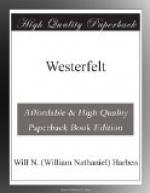Somehow this building interested Westerfelt more than any of the others. He told himself it was because he intended to get his meals there. Finally he decided, as he was not to dine that day with the Bradleys, that he ought to go over at once and speak to the landlady about his board. As he arranged his cravat before the little walnut-framed mirror, which the stable-boys in placing his furniture had hung on the wall, together with a hairbrush and a comb tied to strings, he wondered, with no little pleasurable excitement, if Harriet Floyd had anything to do with the management of the house, and if he would be apt to meet her that morning.
Descending to the office on his way out, he found a young man writing at a desk. It was William Washburn, the book-keeper for the former owners of the livery-stable, whom Westerfelt had retained on Bradley’s recommendation. Washburn was copying accounts from a ledger on to sheets of paper.
“How are they running?” asked Westerfelt, looking over the young man’s shoulder.
“Lots of ’em hain’t wuth the paper they are on,” replied Washburn. “The old firm knowed everybody in creation, an’ never could refuse a soul. When you bought the accounts you didn’t buy gold dollars.”
“I know that, but Bradley said he thought I might collect a good many of them.”
“Oh yes; maybe a half, or tharabouts.”
“Well,” said Westerfelt, indifferently, “we’ll do the best we can.”
“Thar’s a big un that’s no good.” Washburn pointed to an account he had just copied.
“Who’s it on?”
“Toot Wambush.”
“How much?”
“Seventy-eight dollars an’ fifty cents. It’s been runnin’ on fer two yeer, an’ thar hain’t a single credit on it. He never was knowed to pay a cent to nobody.”
“Don’t let anything out to him till the account is paid.”
Washburn looked up with a dubious smile. “He’ll raise a’ awful row. He never wants to go anywhar tell he’s drinkin’, an’ then he’s as ill as a snake an’ will fight at the drop of a hat. Nobody in Cartwright dares to refuse ’im credit.”
“I will, if he doesn’t pay up.”
“D’ y’ ever see ’im?”
“Yes, last night.”
“I’d be cautious if I wus you; he’s a dangerous man, an’ takes offence at the slightest thing.”
“If he gets mad at me for refusing to let him drive my horses when he owes a bill like that, and won’t pay it, he can do so. I obey the law myself, and I will not let drunkards run my business to suit themselves.”
“He’s talking ‘bout goin’ out to his father’s this morning, an’ wants to drive the same rig he had last night.”
“I did not know he had my turnout last night.”
“Yes, you wusn’t heer, an’ I knowed he’d make trouble if I refused him.”
“That’s all right, but don’t let him get in any deeper till the old debt is settled. I’m going over to the hotel a minute.”




